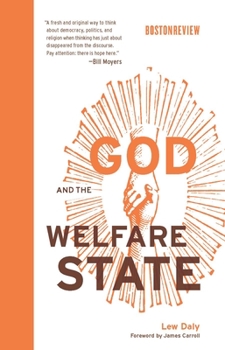God and the Welfare State
Select Format
Select Condition 
Book Overview
Can religion cure poverty? The first book to explore the ideas about God and government behind the faith-based initiative.When the Bush administration's faith-based initiative was introduced in 2001... This description may be from another edition of this product.
Format:Hardcover
Language:English
ISBN:0262042363
ISBN13:9780262042369
Release Date:November 2006
Publisher:MIT Press (MA)
Length:132 Pages
Weight:0.45 lbs.
Dimensions:0.7" x 4.8" x 7.0"
Age Range:18 years and up
Grade Range:Postsecondary and higher
Customer Reviews
2 ratings
Poverty is a serious issue....
Published by Thriftbooks.com User , 16 years ago
An interesting read. I actually picked up this book from a USO rack over in the Middle East while deployed there. It was a welcome contrast to most of the other reading material generally available. For Republican and conservative readers; a note of warning. This book will most likely be offensive to you. However, I strongly recommend you read it just for the perspective. (The comment attributed to Mr Moyers on the front cover should be a good hint of the book's content.) This is a very short and concise essay that wastes no time getting to the point. Poverty is a serious issue not just of America, but for the entire world. And despite all our efforts and the so called "War on Poverty" we have made no meaningful, enduring progress on the issue. As one of the richest countries in the world, we still have a segment of our society that does not have the ability to meet their basic needs and has practically no access to a mechanism to change their situation. Daly frames faith based charities in the above context and admits that government efforts on the area have proven ineffective; thus setting the stage for a different paradigm. His questioning of the motives behind the decision to go with the faith based approach breathes some fresh analysis into the debate: was this new direction really a search for a more effective solution set or a deliberate power-grab? A significant item he glossed over is one of the more important aspects of the religious debate on the issue of poverty in America today. A great portion of Right-Wing thought along these lines is based on scriptures such as 2 Thessalonians 3:10: "For while we were yet with you, we gave you this rule and charge: If anyone will not work, neither let him eat." (AMP) I personally think that this sort of reference is used too often as an excuse to turn a blind eye. However, discussing it would have added a dimension that is missing in the work. Daly's discussion on the origins of the modern, philosophical background of faith based initiatives was illuminating. As a side product, there was an implied but solid discussion of the First Amendment and the power of religious intuitions in America. Because of its brevity and the author's apparent genuine anguish about the subject; this book has little of the self-serving content that most works in this field have to struggle against to get their points across. The point that will most likely be buried or omitted in reviews of this book will be Daly's insistence that faith based programs should not be abandoned. His assertion that we should give them a chance to work with a renewed focus on why they were created is probably the most significant theme of this work. Unfortunately, the portion of the Left Wing that is phobic of religion will ignore this concept and concentrate on his criticism of the program. My only issue with this work is more personal in nature. To me, Daly's Clinton worship undermines the credibility of his work. The idea
The Theology and Scandal of Faith-Based Welfare Initiatives
Published by Thriftbooks.com User , 17 years ago
This little book of only 126 tiny pages starts and ends with very brief critiques of President Bush's Faith-Based and Community Initiative (FBCI), but most of the short essay is a theological and political history of the roots of the FBCI. In the opening and closing he argues that the FBCI is a sham and serves only to fill the coffers of the religious communities that do not need a poverty program. While I would tend to agree with him, he does not provide any evidence that this is so. Because this 20 billion dollar diversion of funds from welfare and other social programs to churches has no rigorous accountability mechanisms built in, the author can not be faulted for not having hard data. However, he does not even tell any anecdotes about the misuse of funds. Nor does he explore why it took Congress 6 years to begin to investigate the FBCI programs. Perhaps it was the author's belief that FBCI philosophy is the only innovative and interesting idea in poverty policy in many decades. He may be right, but his failure to recognize that outcomes and accountability far outweigh innovativeness. To be fairer, he does argue, slightly short of calling President Bush a false prophet, that Christianity and the Bible would find the present day American trends toward vast income inequality scandalous and totally sinful. Hopefully the next book on the topic will provide good evidence for its claims, and hopefully we won't have to wait long for it.





